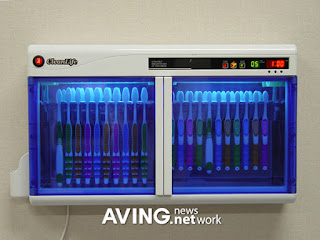 |
| Toothbrushes at the workplace Image provided by Simon (whose Instagram provides a very good peek into life in Seoul, btw) |
One thing that strikes me is how infrequently people seem to brush their teeth here in Central Europe. My question is: Why don't people brush their teeth after lunch, if they're at university or at work all day? (I've also met a higher-than-average number of people with bad breath in France and in Belgium which eventually culminated in me developing skills to implicitly and strategically avoid them)
In Korea, it is an accepted norm that one brushes their teeth after lunch. High schools dedicate space specifically for brushing your teeth. Everybody keeps toothbrush and toothpaste (and mouth wash) in their locker, and if you don't brush your teeth, you'll get called out for being "dirty"(smelly is the exact term if you think about it). Even the smallest convenience stores carry several types of toothbrush kits.
At university, students usually eat at restaurants around campus or at the cafeteria. And after eating, they go to one of the bathrooms on campus, take out their toothbrush kit and brushed their teeth before the afternoon sessions. Every once in a while around 15:30, someone would say "Eek, I haven't brushed my teeth yet!" and rush to the bathroom with their little toothbrush pouch.
In fact, Koreans care so much about dental hygiene that some companies provide dental equipment. Here's an example: IT conglomerate NHN (better known as Naver) has equipped its Bundang HQ with a "Chika-chika room" on each floor, a space entirely dedicated to brushing your teeth ("Chika-chika"refers to the sound people make when brushing their teeth) The rooms are completely separated from the bathrooms, and come with toothbrush sterilisers (image below). Employees leave their toothbrush, toothpaste, mouth wash (called 'gargle' in Korea) and other dental hygiene goods in personal cups or pouches on the shelves (not on image).
At university, students usually eat at restaurants around campus or at the cafeteria. And after eating, they go to one of the bathrooms on campus, take out their toothbrush kit and brushed their teeth before the afternoon sessions. Every once in a while around 15:30, someone would say "Eek, I haven't brushed my teeth yet!" and rush to the bathroom with their little toothbrush pouch.
 |
| "Chika-chika"rooms at NHN Image source: Nara Design |
 |
| A UV-ray & heat sterilising device from Kumhi Oral-Tech (the best image I could find of such a device) |
The first time I saw a UV steriliser for toothbrushes was during my internship at BCG. The Team Leader, a Harvard graduate in his mid-thirties, always kept a little cylindrical something the size of a pencil case plugged into his IBM laptop. It was a portable USB-powered UV steriliser. He was the only one on the 10-person team with the steriliser, but everyone else did always brush their teeth post-lunch.
 |
| All the toothpaste! Again, Image provided by Simon |
 |
| A toothbrush and paste kit from Perioe, one of the most popular dental hygiene brands in Korea. |















